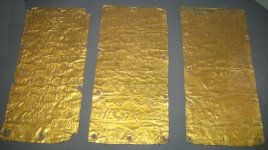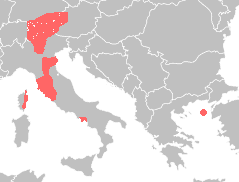Yetos
Regular Member
- Messages
- 5,959
- Reaction score
- 519
- Points
- 113
- Location
- Makedonia
- Ethnic group
- Makedonian original
- Y-DNA haplogroup
- G2a3a
- mtDNA haplogroup
- X2b
Please, be sure that the only "violation" is that I have taken into account the Albanian too.
Specifically, some times ago we debated on the Albanian word "krye"(head), in Gheg dialect "kre" (head), def. "krea" (the head) and the correlation "krye" (head) - "kryej" (do consciously) - "krijoj"(create).
This correlation is unique in all IE languages, classical and modern (except the Sanskrit language which is found in the format "shirah" -"kri" - "srijati").
While the word "krea" (the head) is attested only in modern Albanian, its derivatives are found in classical Greek, in Latin, and in almost all modern European languages. When I say that the etymology of these derivatives is the word "krea" it does not mean that these derivatives are borrowed from modern Albanian. No, it’s borrowed from ancient one, i.e. from Etruscan, Illyrian, Thracian or Dacian. Even I’ve found out that Etruscan word for “head” is “cle” /kle/, def. “clea” /klea/ (compare with Gheg Albanian “cre”/”crea” = “head”/“the head”).
And it’s quite understandable.
On the other hand, the presence of such unique words in Albanian should be considered and studied seriously by linguists.
There is no doubt that all of them (as well as Albanian too) are descended from a common PIE root.
But there is no doubt too that Albanian is closer to PIE than everyone else.
In my opinion, whatever that Albanian is spoken by a relatively small number of speakers, offers some extraordinary surprises to the linguistics.
Now let’s come back to my last post:
What do you think is a nonsense in my above post:
Do you consider as a nonsense my explanation of how Albanian words “ter” and “terr” are wordformed; or simply the fact that a modern Albanian word can not be taken as etymology for a Latin one?
Do you think that Albanian “err” cognates with English “err”?
Does it give you any impression that Gheg Albanian “tu err” (to darken/to obscure” phonetically is quite similar with English “to err” which means “to mistake” or sth like “to sin” (note that the particle “tu” (to) is present in Gheg Albanian too)?
Do you think Gheg Albanian “tu” (to) is borrowed from English “to” or vice versa?
It survives only in English and in Gheg Albanian (if I’m not wrong).
There is another Albanian word (a verb) that is wordformed by Albanian “të err” (or just “t’err”):
Ther = 1- cut down (a human or animal body); slaughter; 2- cut (a human or animal body) just like a surgery operation (compare these meanings with English “to err”);
Theror= sanctuary sacrifice.
Can you realize now that Albanian “ther” is the real wordroot of “terror”? (thus it’s not true that the etymology of “terror” be the PIE *tre- ).
Although Albanian “ther” is a (modern) Albanian word, its derivatives can be found in Latin and in many other modern European languages too.
And now sth for “therapy” (it’s just a guess):
Ther-ap (ther-hap), which literally means “cut-open”.
So, the first meaning of “therapy” would have been “surgery” (mind you, in the meaning of simple surgery for skin wounds).
Albanian, like all other languages, does have borrowings. Anyway, you’re looking at it from the outside and just as you’re taught to. Try to see with your own eyes and to think with your own mind.
well just to remind you Therion and Mega therion (Θηριον) (Eng tear) (killing animal)
Καρα κρανιον for head-sculp (head-bones) and i think armenian also has similar
and therapy has nothing to do with surgery, but with medical treatment
Θεραπενις is the nurse, cognates with either warm either heal, but i can not certify
err as dark might not be IE since we consider it Pelasgic erevos = dark, erebu in semitic, and might have not IE roots



